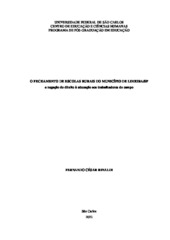| dc.contributor.author | Rinaldi, Fernando César | |
| dc.date.accessioned | 2023-01-12T14:03:14Z | |
| dc.date.available | 2023-01-12T14:03:14Z | |
| dc.date.issued | 2022-08-25 | |
| dc.identifier.citation | RINALDI, Fernando César. O fechamento de escolas rurais do município de Limeira/SP: a negação do direito à educação aos trabalhadores do campo. 2022. Tese (Doutorado em Educação) – Universidade Federal de São Carlos, São Carlos, 2022. Disponível em: https://repositorio.ufscar.br/handle/ufscar/17209. | * |
| dc.identifier.uri | https://repositorio.ufscar.br/handle/ufscar/17209 | |
| dc.description.abstract | This research has aimed to analyze the problems that closing rural schools policy brings to individuals who live in rural areas. The work started from the hypothesis, verified and confirmed in the thesis, that the closure of the activities of these educational units causes social impacts to those affected by the procedure, as well as the subjects that may be impacted, due to a possible closure of the activities of the educational establishments public active in the field. The study was carried out in the city of Limeira, in São Paulo State, with students from the rural area enrolled in Kindergarten and Elementary countryside public schools in Limeira, and with those who had already been transferred to urban ones. For this, the research method historical-dialectical materialism was used, for the understanding of social reality; as well as bibliographic review techniques, documental and field research. The results show that, for the population already affected by the closure of the activities of the rural establishments where they studied, the most significant social impacts refer to the feeling of abandonment by the public power and the loss of the school as a reference for the community; for those who were not affected, the issue involving transportation, the distance to be traveled between home and school, and the parent´s concern for the safety of their child when studying in urban school are the impacts of greatest concern. It was noticed that, in view of the closure of rural schools, the population and workers living in the countryside must accept school transport or be denied the right to receive free education offered by the State, where they reside. | eng |
| dc.description.sponsorship | Não recebi financiamento | por |
| dc.language.iso | por | por |
| dc.publisher | Universidade Federal de São Carlos | por |
| dc.rights | Attribution-NonCommercial-NoDerivs 3.0 Brazil | * |
| dc.rights.uri | http://creativecommons.org/licenses/by-nc-nd/3.0/br/ | * |
| dc.subject | Educação no campo | por |
| dc.subject | Educação rural | por |
| dc.subject | Fechamento de escolas no campo | por |
| dc.subject | Impacto social pelo fechamento | por |
| dc.subject | Políticas de educação do campo | por |
| dc.subject | Education in the countryside | eng |
| dc.subject | Rural education | eng |
| dc.subject | Closure of schools in the countryside | eng |
| dc.subject | Social impact of closure | eng |
| dc.subject | Rural education policies | eng |
| dc.title | O fechamento de escolas rurais do município de Limeira/SP: a negação do direito à educação aos trabalhadores do campo | por |
| dc.title.alternative | The closing of rural schools in the municipality of Limeira/SP: the denial of the right to education to rural workers | eng |
| dc.type | Tese | por |
| dc.contributor.advisor1 | Bezerra Neto, Luiz | |
| dc.contributor.advisor1Lattes | http://lattes.cnpq.br/4809080593333472 | por |
| dc.description.resumo | Esta pesquisa teve como objetivo analisar os problemas que a política de fechamento das escolas do campo traz aos indivíduos que habitam na área rural. O trabalho partiu da hipótese, verificada e confirmada na tese, de que o encerramento das atividades dessas unidades educacionais causa impactos sociais aos afetados pelo procedimento, assim como os sujeitos que podem ser impactados, em decorrência de um eventual encerramento das atividades dos estabelecimentos de educação pública em atividade no campo. O estudo foi realizado no município de Limeira, no Estado de São Paulo, com alunos da área rural matriculados no ensino Infantil e Fundamental I nas escolas do campo da Rede Pública Municipal de Ensino de Limeira, e com aqueles que já foram transferidos para as escolas urbanas. Para isso, foi utilizado o método de investigação materialismo histórico-dialético, para o entendimento da realidade social; assim como as técnicas de revisão bibliográfica, a pesquisa documental e de campo. Os resultados encontrados demonstram que, para a população já afetada pelo encerramento das atividades dos estabelecimentos rurais em que estudavam, os impactos sociais mais significativos referem-se ao sentimento de abandono pelo poder público e à perda da escola como referência para a comunidade; já para aqueles que não foram afetados, a questão envolvendo o transporte, a distância a ser percorrida entre casa-escola, e a preocupação dos pais com a segurança do filho ao estudar na escola urbana são os impactos de maior preocupação. Percebeu-se que, diante do fechamento das escolas rurais, a população e os trabalhadores que vivem no campo devem aceitar o transporte escolar ou terem negado o direito de receber a educação gratuita oferecida pelo Estado, onde residem. | por |
| dc.publisher.initials | UFSCar | por |
| dc.publisher.program | Programa de Pós-Graduação em Educação - PPGE | por |
| dc.subject.cnpq | CIENCIAS HUMANAS::EDUCACAO | por |
| dc.subject.cnpq | CIENCIAS HUMANAS::EDUCACAO::FUNDAMENTOS DA EDUCACAO | por |
| dc.publisher.address | Câmpus São Carlos | por |
| dc.contributor.authorlattes | http://lattes.cnpq.br/4569165581850843 | por |


